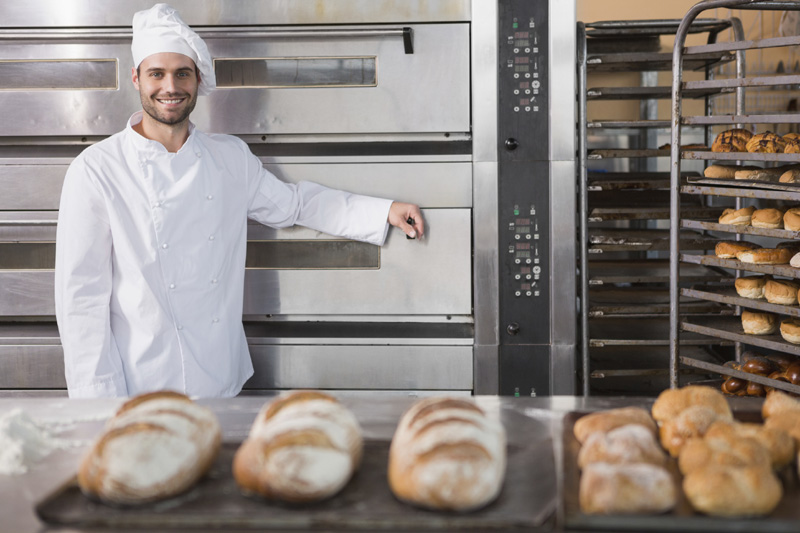What Working as a Pastry Chef is Like

Most of us have in our minds the image of the quintessential pastry chef – the round, smiling man with rosy cheeks and flour streaked across his apron. However, the number of different career opportunities available for pastry chefs is far more diverse than you might expect, with each position requiring different skills and strengths. If you think the field might be for you, read on for more information.
Pastry Chef Education
Even talented home bakers should expect to attend culinary school before pursuing work as a pastry chef. Pastry chefs are expected to be familiar with many different dough preparations and cooking styles, so it’s unlikely that you’ll be able to cultivate these varied skills on your own in your home kitchen. Fortunately, many community colleges offer pastry chef programs that take two years or less, many of which offer night classes to accommodate working students. If you’re interested in pursuing a career in this field, check with your local community or technical college to see if they offer a pastry chef program.
Entering the Working World
Unlike traditional chefs, who move from culinary school to positions as prep or line cooks, pastry chefs have a number of different options in terms of entry-level positions. Pastry chefs interested in working for the top restaurants in the world will find that many mid- to upscale restaurants hire several pastry chefs to supply the restaurant’s desserts. Because there are fewer pastry chefs than traditional chefs, talented entry-level graduates may be able to snag these positions or quickly work their way up to them from smaller-scale restaurants. In addition, pastry chefs may find work in dorm kitchens, hospitals or nursing home facilities, where they’ll produce the desserts served to residents each day.
However, many pastry chefs choose to eschew the competitive restaurant industry to work as self-employed pastry artists, opening their own bakeries and shops. Many pastry chefs who choose to go this route specialize in wedding cake decoration and find the industry to be quite lucrative, as popular wedding cakes can sell for $5,000 or more a piece. But there are a few pitfalls to this career path as well. Pastry chefs who own their own bakeries need to be as well versed in business practices as they are at making cakes and cookies, and the multi-tasking necessary to own a small business isn’t for everyone. Even freelance pastry chefs who don’t operate separate stores will need to work constantly to promote themselves and their work in the crowded wedding and special event niche.
With all these varying responsibilities in mind, other pastry chefs choose to take positions with companies that produce commercial baked goods, such as Keebler or Nestle. These companies often hire pastry chefs to be part of their R&D teams to help develop and test new product ideas. The working conditions for these positions are quite different from working in a restaurant or in your own business, since you’ll likely work defined hours for a set salary and benefits. Although some pastry chefs find that they miss seeing the immediate satisfaction their desserts bring to customers while working in commercial bakeries, others find the more relaxed working conditions to be a welcome trade-off.
Pastry Chef School
Let’s face it…there is just something so delightful about a job with a title like “pastry chef”. A pastry chef is someone who makes beautiful, delicious and often exquisite desserts for bakeries and special occasions. This is a career that makes products everyone appreciates and there aren’t many like that around!
Pastry chef schools teach the fine art of creating these delectable sweets. Despite the temptation to wax poetic, a pastry chef is a professional who takes a series of classes that teach how to create cakes, desserts and tortes and also business management and kitchen supervision.
What You Will Learn
You can attend a culinary arts school and obtain an Associates or Bachelor’s Degree in Baking and Pastry Arts. Pastry chef schooling will cover:
- Baking fancy desserts and sweet treats
- The art of making various doughs, fillings, frostings and glazes
- Nutrition including creating low fat versions of popular desserts
- Kitchen management
- Use of kitchen equipment
- Health standards and food safety
- Ordering supplies
- Business management
The types of desserts you will learn to make include tarts, cream puffs, croissants, quick breads, meringue, mousse, petits fours, marzipan, wedding cakes and many more.
A Sweet Career!
Completing a pastry chef training program prepares you to work as a specialty chef in a restaurant. You can also find employment in a bakery, with a cruise line, or as a chocolatier. Some pastry chefs work as caterers or are part of a team that handles large special events at convention centers. Self-employed pastry chefs sell desserts to bakery shops, restaurants, wedding groups, or operate their own special dessert businesses.
The salaries for those completing pastry chef colleges can vary by quite a bit. Typically a pastry chef will begin a career in a low level position as a trainee and accumulate experience that can lead to a head chef or baker position.
One of the main demand areas for those with pastry chef training is the wedding industry. Pastry chefs that can create beautiful and elaborate wedding cakes are almost always in demand. A pastry chef is part baker and part artist, and the ability to use creative talents is one of the characteristics many find so appealing.
Skills You Need
To earn a pastry chef degree you will need to complete coursework and hands-on training creating actual desserts. As a chef you must be able to stand on your feet for many hours at a time and have finger and hand dexterity. You will be required to regularly lift heavy filled pots and pans. In addition, bakers and pastry chefs must frequently start work very early so that products are ready by breakfast time.
Naturally, a pastry chef must also be able to pay attention to details and have patience. Creating the elaborate decorated desserts is like an art form and takes much control and practice.






